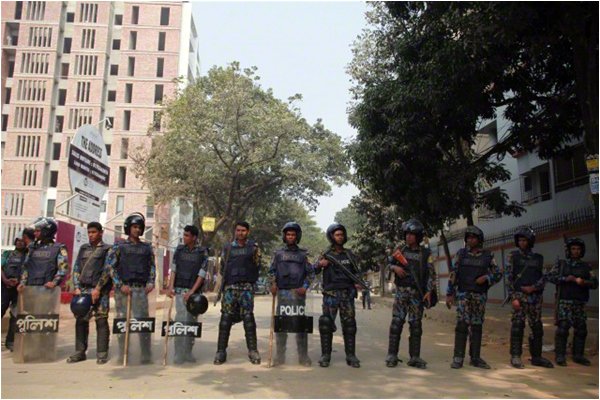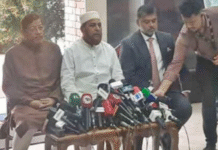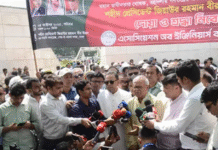by William Milam
Our worst fears regarding the political crisis in Bangladesh appear to be realized. The nightmares that rode upon our sleep regarding the ultimate outcome of the political crisis that was locked into place by the January 5, 2014 election are becoming reality. The extremists — by that I mean the extremists in the two major parties – have taken over. The rest will be very bloody, no matter how it ends.
Predictions a year ago to this effect were dismissed by authorities everywhere, neighboring India, Western donors, and the International Organizations. Even in Bangladesh itself, denial dominated – by the Awami League (AL) one-party government, whose determined actions to destroy the main opposition party, the Bangladesh Nation Party (BNP), did much to create and sustain the crisis; and by an opposition which has become more feckless and desperate as the pressure on it mounted. Perhaps all involved should have remembered the celebrated words of the great Irish poet, WB Yeats, who wrote the words quoted in the title of this piece in anticipation of another political crisis, of more monumental proportions, in another century. When the blood-dimmed tide is loosed, he wrote, “the best lack all conviction, while the worst are full of passionate intensity.”
The current situation in Bangladesh can only be described as incipient anarchy. The leaders of both major parties appear to have lost control of the passionately intense segments of their parties, those segments willing and able to use extreme measures, to take down their opponents, and to do so in the absence of any direction from their leaders. In other words, the extremists in both parties are taking over control of the action on the streets, in the jails, and elsewhere, and the common core is violence and death.
This is apparent in the increasing reportage of killings, fire-bombings, and other violent street actions by those elements of the BNP able to undertake and carry out street actions to disrupt life in the country and, they hope, bring about a public backlash against the government. These elements claim to be fighting back against the government’s campaign to destroy the BNP. In a sense they tell it like it is as the government’s plan to decimate the opposition has been clear since the election of 13 months ago.
Since the government controls most media channels, this growing list of atrocities in widely known and, in some quarters, bringing increased opprobrium on the party itself. While the BNP leaders still speak publicly of hartals (general strikes) and movements to force the government at least to talks on a new and fair election, it is very doubtful that they are directing the violence in the streets. In fact, the government’s tactics of cutting off BNP leaders’ communication with party faithful has reduced their ability to communicate with their own followers. Among other things, the government has imprisoned them in their offices or houses, or arrested them, or driven them into hiding by the threat of arrest. Logic tells us that the BNP street tactics are now pretty much directed by the party extremists in the streets on an ad hoc basis.
What is less well known is the exponential increase in extra-judicial killings by the government’s police and paramilitary units, who are supposed to be the forces of law and order, but seem more truly to be only the forces of lawlessness and disorder. The evidence of these crimes is, perforce, more anecdotal, given the government’s control of media and communication channels, but it is convincing. Many include grisly photos, which I don’t recommend unless readers have a taste for the macabre. Extra-judicial killings have been increasing for many months now, but have increased exponentially in the past few weeks. These killings are explained in a number of ways—“caught in a crossfire,” “shot trying to escape,” “run over by a truck” (meaning either death under torture or really getting run over by a truck, which I am told is a new form of extra-judicial killing), and others equally disgusting.
Though it may seem naïve on my part, I think it unlikely that this increase in extra-judicial killings is orchestrated from the top of the AL. Again, it seems to me to be a case of the troops going far beyond their leaders’ intentions. As in the case of the BNP, these intensely passionate defenders of the faith are willing to stop at nothing to preserve their own positions, and to ensure that the other side won’t win and retaliate.
Ali Riaz, perhaps the preeminent US expert on Bangladesh, warned about this possible outcome almost a year ago in an article in the April edition of Current History. I echoed this concern in an article in another Pakistan English language journal at about the same time. I wrote the following, “…the AL came to power (and was supported by India) on its platform of ridding the country of extremism. But Riaz (along many other observers) believes that the government’s clearly authoritarian mindset and increasingly authoritarian actions, will `encourage the extremists.’ He is right, and I know he meant “extremists” in a broader sense than we use that term these days. Yes there remain some Islamist extremists (militants) in Bangladesh, and the Government’s actions will surely stir them up and add to their recruiting message. But there are extremists that are not Islamists and not militants, and they are not just more numerous but they are more dangerous. These are the extremists in the political parties—both major parties—who will drive their leaders to more extreme measures [or take such measures themselves] in order to keep the government in power (the AL extremists) or to bring the government down.”
Where will it all end? The Economist magazine believes that the logic of the situation will ultimately draw the Army in, and that some sort of intervention is likely. It notes, however, that the Army is not keen on intervening, its top ranks having been cleaned out of general officers who might have been more inclined to do so by the AL government, its desire to safeguard its own business interests in the country, and by a fear of losing its UN Peacekeeping preeminence. All this is true, although the UN has put out a statement I find ambiguous trying to delink Bangladesh politics from UN Peacekeeping missions, which could be read as a warning not to get involved. Or, perhaps, the statement recognizes the agonizing pressures the anarchic political situation might place on the Army, and the possibility it could not help getting involved. It would seem an ironic conclusion that the Bangladesh Army so valued by the UN as a Peacekeeping unit in other countries would not be trusted to keep the peace in its own country.
Source: NYTimes










